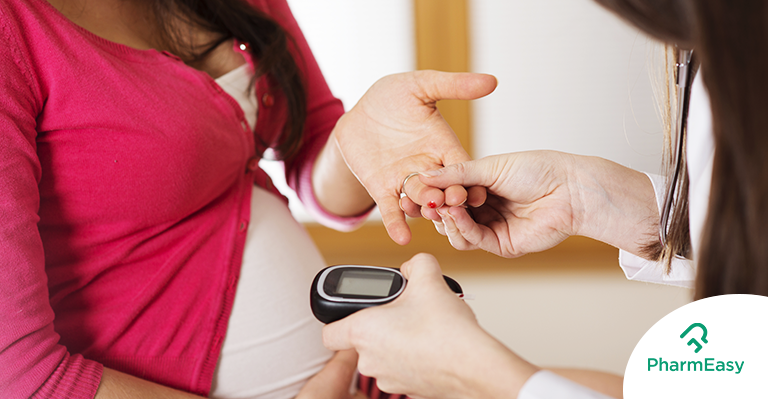Precautions To Take When Pregnant With Type 1 Diabetes
By Dhwani Jerajani +2 more

Download PharmEasy App




Register to Avail the Offer
Send OTPBy continuing, you agree with our Privacy Policy and Terms and Conditions
By Dhwani Jerajani +2 more
Pregnancy is a journey through which almost every woman would want to travel at least once in her lifetime. For some, this journey is a cakewalk, without any hindrance, making it an enjoyable experience. Whereas for some, challenges begin from the time they plan to have a baby like it is in the case of women suffering from type 1 diabetes. During pregnancy, various factors come into play like hormonal changes, mood swings, nausea, vomiting, cravings, etc. Hence, it becomes more difficult to have good control over your blood sugar levels.
For any woman suffering from type 1 diabetes, it is very important to control her blood sugar levels from the day she plans to conceive until the baby is delivered. Also, she should work with an experienced gynaecologist/obstetrician along with the supervision of an endocrinologist who has worked with such patients previously.

During pregnancy, a diabetic woman would face a lot of challenges because of strict sugar control. The following strategies will ensure a healthy pregnancy and a healthy baby:
Keeping your HbA1C levels on target is very important because blood sugar levels that stay high during pregnancy may cause your baby to grow too large (macrosomia) or harm the early development of organs and lead to birth defects and also delay lung maturity.
Dr. M.G. Kartheeka, MBBS, MD
Also Read: How To Wash Out Sperm To Prevent Pregnancy: A Comprehensive Contraception Guide
During pregnancy, the probability of suffering from hypoglycemia increases a lot, hence be aware of its signs and symptoms and try to educate people around you, so they are well-equipped to handle an emergency. Always keep a fast-acting carbohydrate handy. Hypoglycemia limits the mother’s amount of glucose stores, which may affect the developing infant and hence, is at risk of developing various long-term conditions, such as cognitive deficits, developmental abnormalities, and hypertension.
During pregnancy, the need for insulin also increases significantly. Insulin itself does not have any side effects on the baby, but high blood sugar does. The main concern is congenital malformations in the form of neural tube defects (such as spina bifida) and congenital abnormalities of the heart.
Learn not to give in to your sugar cravings easily because this will disrupt your sugar levels. Always try opting for healthier alternatives to suffice your sweet tooth. Keep a tab of your calories so you know when you can indulge.
Read More: Foods to Avoid in Gestational Diabetes
A continuous glucose monitor could be a handy tool to keep a close watch on your blood glucose level. This device gives speedy feedback on your blood sugar levels and rates of change so that you can alter your routine immediately.
It is essential that a diabetic woman maintain tight control over her blood sugar before she plans another pregnancy. Hence, she must opt for adequate birth control post-delivery. Always discuss the family planning methods you prefer with your doctor so that they can be put in place after delivery.
Also Read: Foods That Fight Nausea During Pregnancy: Guide For Expecting Mothers
Occasional fluctuation in your glucose levels will not harm the baby if your HbA1C is under control. Having a baby has always been tough, and if you have type 1 diabetes, you must be more cautious to ensure a healthy baby.
Read More: Gestational Diabetes During Pregnancy: Its Symptoms, Causes And Risks
Links and product recommendations in the information provided here are advertisements of third-party products available on the website. PharmEasy does not make any representation on the accuracy or suitability of such products/services. Advertisements do not influence the editorial decisions or content. The information in this blog is subject to change without notice. The authors and administrators reserve the right to modify, add, or remove content without notification. It is your responsibility to review this disclaimer regularly for any changes.
Comments